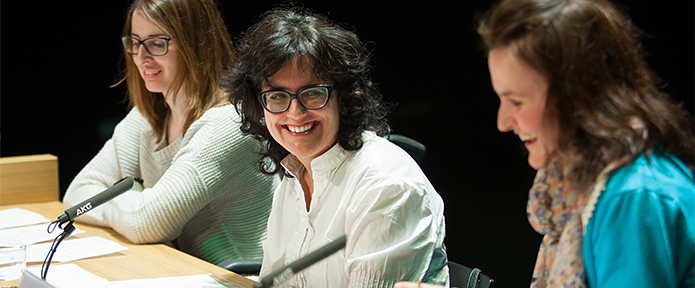2017-02-24-noticia-Tantaka-capacitarse
Almost 45% of women with disabilities in Navarre suffer abuse, according to a COCEMFE study.
Last session of the cycle 'Training to understand disability', organized by Tantaka at the University

The course 'Empowering to understand disability', organized by Tantaka -the Solidarity Time Bank of the University of Navarra- ended last Monday, February 27 with the roundtable 'Achievements of women with disabilities'. In the session, at position of the Spanish Confederation of People with Physical and Organic Disabilities (COCEMFE), the director Edurne Jáuregui explained that 45% of women with disabilities attending her empowerment workshop have suffered abuse.
Likewise, COCEMFE users Idoia Orduña and María Miculaiciuc assured in first person that their disability is only a characteristic, which does not determine their contribution to society. "I like to turn my weaknesses into qualities. I define myself, I decide if I want to smile every day or to be wilted," said Miculaiciuc, "I give value and meaning to my disability. I live without limits.
The Tantaka cycle has been held at the University of Navarra during the four Mondays of February. Its IV edition gives a voice to people who, with their mental illness or disability, face different challenges in their daily lives, and has attracted around 400 attendees in each session. "The opportunity to listen to people with diversity enables us to realize the many job skills they have," says Tantaka's coordinator, Sofía Collantes.

The first quotation, 'Mental illness and employment', featured psychiatrist Lorena de Simón and four of her patients with bipolar or schizophrenia. They emphasized that the family is a fundamental pillar for them, and work a way to improve their illness. "My big fear is not having work. For me, and for many, the problem is not the mental illness, but not having work", said one patient emphatically. On the other hand, they explained that one in four people suffer from a mental illness at some point in their lives. "Ninety-nine percent of my patients do not tell their companies that they have mental illness. And they are both employees and bosses," Dr. De Simón also pointed out.
Luis Casado approached 'Communication for an inclusive society'. At the age of 12 he was diagnosed with a degenerative disease that would completely take away his sight. graduate in Journalism, advertising and Public Relations at the University of Navarra, he was director marketing at Kukuxumusu and currently advises other companies on the adaptation of their products. She explained that Inclusive Marketing - the name of her own company - is one that thinks of all people. "In the age of image there are millions of people excluded because of their visual impairment," she said, giving several real examples.

Lorea Lamata, from association Síndrome de Down de Navarra; her boss Leo Gainza, director of the Veterinary Clinic of Burlada; and Araceli Echaide, coordinator of project Ítaca Síndrome de Down Navarra, starred in the session 'Contributions of people with disabilities to society'. Lorea demonstrated that she is as apt as anyone else to perform cleaning, administrative and financial aid tasks at operating room of the veterinary center where she works. "Disability is a circumstantial issue. We are all able and disabled for different things," stressed her employer.

